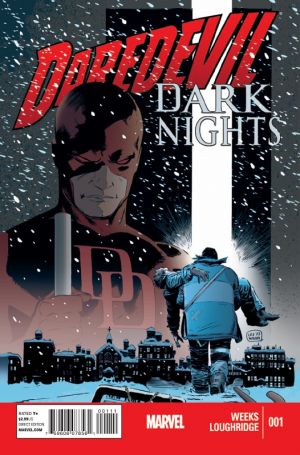The Gospel According To Daredevil
Comic book stories are rarely faith-affirming. Christians are often portrayed as psychopaths, con men, or as wildly intolerant. For example, a group of Christian-like characters are portrayed as crazy fanatics jumping off a building so Superman will save them, in the recent story arc “Saved” from Adventures of Superman #19 and #20.
 This is what makes Marvel’s “Angels Unaware” story arch from the anthology series Daredevil Dark Nights Issues 1-3 so stunning. It was a well-told, evocative comic book tale that powerfully portrayed/proclaimed the truth of the Gospel.
This is what makes Marvel’s “Angels Unaware” story arch from the anthology series Daredevil Dark Nights Issues 1-3 so stunning. It was a well-told, evocative comic book tale that powerfully portrayed/proclaimed the truth of the Gospel.
“Angels Unaware” is written and drawn by Lee Weeks, best know for his artwork on the main Daredevil title in the 1990s. While Marvel is known is for overblown epics, Weeks opts for a much simpler set up. New York City is hit with a monster blizzard. Blind lawyer Matt Murdoch takes a blow to the head when battling some ruffians that leaves him with a temporary case of amnesia and lands him in the hospital with no identification. At the same time, a tragic car accident gives a young girl a chance at a new heart, but the helicopter transporting the organ is brought down in the storm.
Two members of the hospital staff discovered the injured blind man is Daredevil and it’s a good thing. Daredevil, with his powerful senses and radar vision, is their only hope of getting the heart from the crashed helicopter before it’s too late.
Because the story isn’t too bloated, Weeks is able to make it work on so many levels. The heart is a ticking time bomb that drives the story as Daredevil battles both man and nature to make it through the storm. At the same time, the story is able to look at what makes Matt Murdoch and what makes a hero. It also focuses on the decisions a hero has to make. En route to get the heart, Daredevil has to choose to ignore some cries for help and answer others. He has to make judgments and at least one of them turns out to be wrong.
Many comics can only be understood if you have a good grasp of fifty years of back story. However, “Angels Unaware” can be read by readers who are unaware of all the ins and outs of Daredevil’s long history.
The faith element is huge throughout the book. Of course, the entire series title references Hebrews 13:2 (KJV), “Be not forgetful to entertain strangers: for thereby some have entertained angels unawares.”
As Issue 1 opens, Matt Murdoch is reading the Bible. Throughout the first issue, we see quite a few scripture quotations often used to dramatic effect particularly on the last page, as well as a 21st Century version of the “Good Samaritan” when Matt is knocked out, his wallet stolen, and he is left by the side of the road as the snow comes down. Issue 2 sticks to just one scripture quote but it sets up the rest of the story. Issue 3 makes this story arc stand out from other comic books that have appropriated scriptural references.
It begins with an unconscious Daredevil reflecting on his life and his failures and the hope that somehow saving a girl in need of a heart can atone for his failures. As with the rest of the book, Weeks keeps things simple and doesn’t subject us to all the backstory.
Truth is, there are few superheroes who’ve sunk to lower depths than Daredevil. Frank Miller began the process of making Daredevil on the cutting edge of the darker heroes in the 1980s. However, in Daredevil’s second volume from 1998-2010, writers such as Brian Michael Bendis, Ed Brubaker, and Andy Diggle put Daredevil through the most hopeless and depressing stories any superhero has experienced. A series of broken relationships, deaths, and misery saw him become the new Kingpin and get possessed by a demon while leading a band of ninjas to establish his own order on New York’s streets. He even considered killing his best friend, Foggy Nelson, at the end of the second volume.
This traumatic decade plus of suffering and sin was addressed briefly in a backup story in the first issue of Daredevil’s third volume written by Mark Waid. It found Murdoch unusually chipper and in good spirits and acting much more like the swashbuckling hero Stan Lee created in 1964 than the darker character of recent memory. Regarding the last few “miserable years,” Murdoch explains to Foggy Nelson, “Every time I thought I’d finally hit bottom, God somehow found a bigger shovel. All of this pain and loss, I just can’t bear the weight of it and stay sane.”
For this reason, he’s decided to fundamentally become a more positive, upbeat person. He gives Foggy (and by extension the readers) the option of viewing him as “being in denial” and “not dealing.” Of course, it’s obvious that’s exactly what he’s doing.
Waid uses this to brilliant effect to create a great series that has readers wondering when Murdoch is going to snap. Weeks’ Daredevil is a bit more realistic and in touch with himself. Like so many heroes, he’s seeking redemption from sins of ages past. This sort of guilt also keeps heroes like Batman and Spider-Man doing their thing.
The ultimate tragedy is that they’re doomed to never actually find the redemption they want. No matter how many criminals Batman gets off the street, he will never be rid of the false guilt of his parents’ deaths when he was a child, and Peter will never escape the tragic consequences of Uncle Ben’s death. At the characters’ darkest moments, you can’t help but wish that someone somehow would communicate the truth of the gospel to them.
What made “Angels Unaware” so unique is that someone did. Even better, Issue 3 does it in a way that’s not only not hokey; it is poignant, powerful, and straightforward. When I reached the end, I was stunned at what I’d just read: a Christian superhero story with great theology published by Marvel comics.
It’s a story I never would have imagined could be published. Not only is the message of the book of commendable, the story’s quality is superb. It represents what comic books can be at their best: thought-provoking and moving, while containing its fair share of excitement and drama, and comic book art worthy of the name “art.”
This story arc does have some scenes that may not be appropriate for pre-teen and younger readers. For everyone else, I can’t recommend it more highly.
Daredevil Dark Nights Issues 1-3 contain the Angels Unaware story arch and is available wherever comic books are sold. A digital version is available for computer or mobile devoices through comixology.com.






























Added to my goodreads